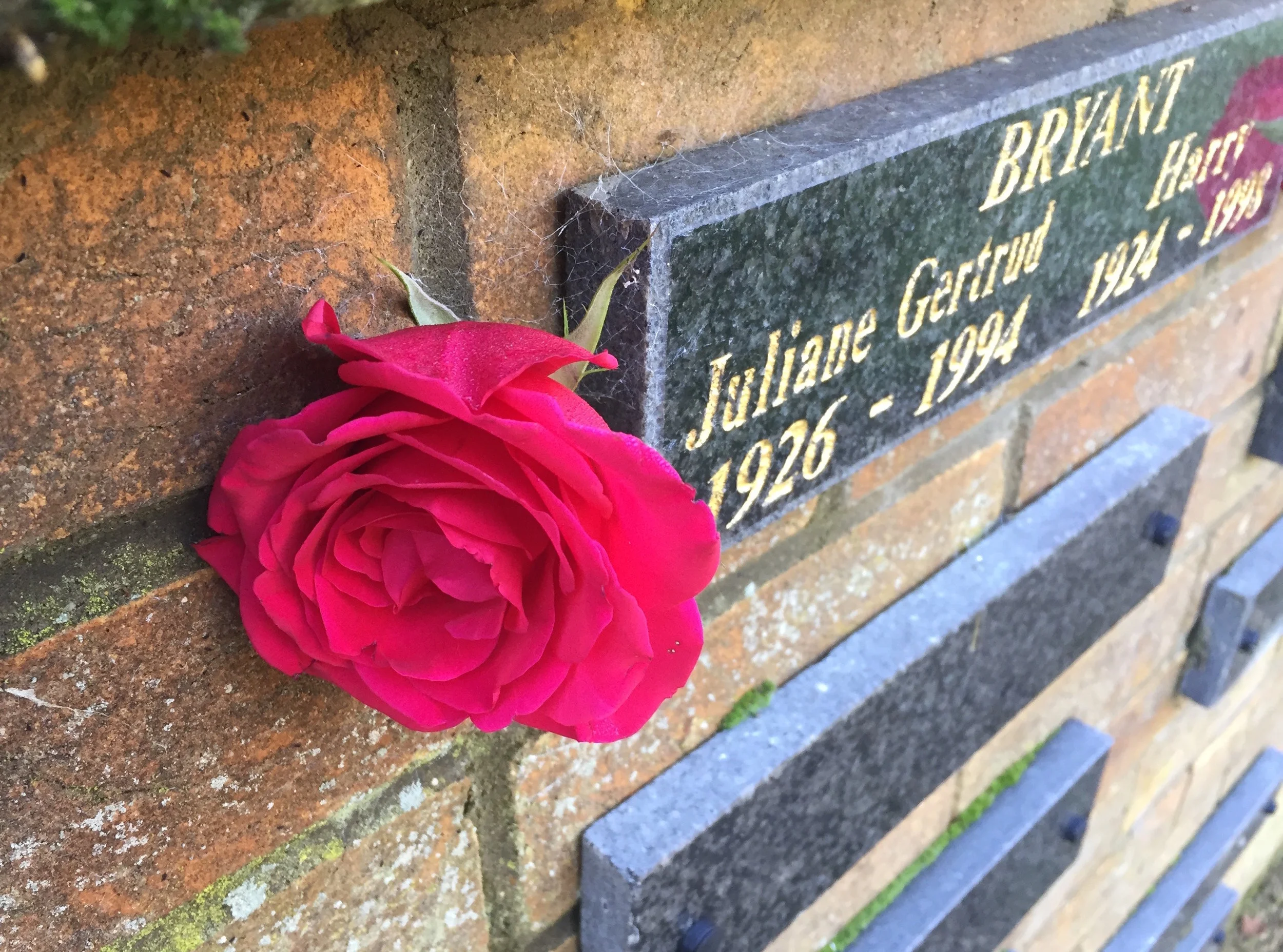PART TWO - Types of Funeral Ceremony
The big questions - Burial or Cremation?
If you only want to make one decision about your funeral ceremony, this is the one – do you want to be buried or cremated? It’s important that you express this wish beforehand so your family aren’t left with an agonising choice, wondering which you would have preferred. The outcome of your decision will also have an impact on where your funeral ceremony takes place, in particular the ‘committal’ aspect of it (the part of a ceremony where you are lowered into the ground at burial or committed for cremation). Here are some considerations to help you…
Burial
“To lie in the soft brown earth, with the grass waving above one’s head, and listen to silence. To have no yesterday and no tomorrow. To forget time, to forgive life, to be at peace.”
Is there a specific place where you’d like to be buried? A local cemetery, church graveyard, or Green Burial site? Contrary to popular belief, you can be buried in your own back garden, but it does, of course, require the fulfilment of certain conditions, such as inclusion on the house deeds (not to mention the agreement of your loved ones who will be gardening, and BBQ-ing next to you for however many years, or may want to sell the house at some point). The same goes for any burial plot – permissions need to be given and conditions met. There’s also cost to consider – burial is almost always more expensive than cremation, as it involves purchasing a plot, as well as a burial fee, grave digging costs, a possible headstone, etc. And if you want to be buried in an area where you are no longer a resident, the fees will rise astronomically.
In terms of the ceremony, you can have a graveside service, although the unpredictable British weather can make for interesting proceedings! It’s one thing standing in a summer meadow, sharing memories as the sun shines and birds sing, but quite another when the wind is howling and I’d be shouting to be heard over the drumming of rain on umbrellas. Some cemeteries, however, have a chapel where you can hold a ceremony first before making your way to the graveside for the committal. Although some of these chapels are very small, not particularly comfortable, and audio-visual facilities virtually non-existent. There’s also the option of a church service, if you are religious. Or you could have your ceremony at a separate venue either before or after the burial, such as a village hall, function room, even your own home, where refreshments can also be taken there afterwards.
Just remember, if you wish to be ‘present’ at your own ceremony, the venue will need to be happy with a coffin on the premises and considerations made if there are steep stairs or anything that might prove hazardous to your arrival. You don’t want to make too much of a dramatic entrance… that has happened!
Cremation
All towns and cities will have a local crematorium. You may have a preference about which one you’d like to be taken to, but do consider where your loved ones and friends will be travelling from to get there on the day. The crematorium will have one or two chapels where the funeral ceremony and committal can be held together. You may even wish to have your ashes scattered or interred in the grounds of the crematorium a few days later, in which case you can do everything in one place. How convenient! However, sometimes people choose to simply have a committal at the crematorium, with or without loved ones present. Then, as we discussed for burials, you could have a separate ceremony at another venue either before or after the committal. We’ll talk more about alternative venues later…
Crematorium services do have time restrictions. For example, the local crematorium I worked at had 30 minute services – this included the time it took to enter and leave the chapel so you actually ended up with about 20 minutes for the ceremony itself, although you could book an extended ceremony of 60 minutes. Other crematoriums have 45 minutes or services on the hour. Fees vary depending on whether you are having just a committal, a standard ceremony or extended ceremony. The time of day can also factor in the price – early services tend to be cheaper, while a Saturday ceremony will be much more expensive.
Most, if not all, crematoriums are happy to show people around, with prior arrangement. It’s certainly worth doing as, not only do you get to see the chapels and grounds, but you’ll also be given a glimpse of what happens behind the scenes. This is all done very sensitively, of course, and it gives the general public a chance to learn about what really happens and reassuringly puts to rest some of the myths and misinformation that seems to abound, ie. that coffins are re-used afterwards, or that ashes from various bodies are combined. Neither is true!
The weird and wonderful…
There are some interesting (and downright bizarre) developments happening in the world of funerals, in particular the options for what we can do with our bodies, from freeze drying and mushroom suits, to eternal reefs and space burial. Some of them are available now, some are still being fine-tuned. Who knows what will be on offer when our time comes?! But if you’ve seen something that takes your fancy, write it down. You might also want to start saving as most come with a hefty price tag!
Your Ashes
With a cremation you do, of course, have cremated remains to consider. Ashes are available for collection a certain number of days after the funeral, either by the Funeral Directors on behalf of your family, or by your family. This will have been agreed beforehand. Or, as I mentioned earlier, your ashes can remain at the crematorium and be scattered or interred there by staff alone, by staff together with family members, or in a short ceremony with a Celebrant or minister.
“To live in this world you must be able to do three things: to love what is mortal; to hold it against your bones knowing your own life depends on it; and, when the time comes to let it go, to let it go.”
If you don’t want your final resting place to be the grounds of a crematorium then, frankly, the world is your oyster! Is there a favourite spot where you’d like to have your ashes scattered – a beach, a garden, by rocket into the sky? Or would you like your ashes interred alongside a loved one in a cemetery or underneath a tree in a Woodland Burial Ground? Or perhaps you’d be happier in a nice urn on the mantlepiece where you can still see the telly? The decision is yours. Although, like most things we’ve talked about so far, there can be considerations and permissions to factor in – requesting your ashes are scattered in your favourite pub, for example, might not go down well with the landlord and locals. So check first.
Memorial Ceremonies
We’ve talked about funeral ceremonies which happen on the same day as the committal – either at the same time, beforehand or afterwards. But if you want more of a celebration of life, or memorial ceremony, on another day, away from the committal, you perhaps have more freedom of venue and location. You’ll notice this often happens for public figures or celebrities, where there is a private family funeral but friends and colleagues gather for a memorial ceremony in the weeks that follow. So you could have a special gathering somewhere much more personal to you – on a beach where you holidayed, in a park where you walked the dog, a pub that was your favourite watering hole or some other landmark which has meaning to you and your loved ones. These provide the opportunity for more of a ‘party’ in your honour, if that takes your fancy. It could also tie in with the scattering of your ashes.
What if there is no body to bury or cremate?
This might happen if someone has left their body to medical science, chosen to end their life at a facility such as Dignitas, or perhaps their body was never recovered following an accident. But in all these cases, and others, you can still have a memorial ceremony. I did such a ceremony for a man who was lost at sea and it was a truly wonderful event, in terms of being both comforting and uplifting. It gave his family and friends the much-needed opportunity to come together, acknowledge his loss, celebrate his life and say farewell in their own way.
WHAT DO YOU WANT THE FOCUS OF YOUR CEREMONY TO BE?
Funeral ceremonies are NOT neatly divided into the religious and the non-religious. Or at least they shouldn’t be. That’s a good thing, as far as I can see because we’re all uniquely different and each funeral ceremony should reflect that. I approached each of my ceremonies with the intention of capturing the essence of the person who has died – their character and qualities, their individual beliefs, values and wishes – while reflecting the wishes and feelings of their family. But for the purposes of helping you decide what sort of ceremony you might like, and the type of person who could lead that ceremony, I will ‘categorise’ your main options. Just keep in mind how you’d like people to feel on the day, as well as what fits with your idea of giving thanks for a life…
A ‘life-led’ ceremony…
This is a funeral ceremony where you, your life, and the people who shared your life, are the main focus of events. You can make this as colourful as you like with all sorts of music, video clips, tributes, photographs. Or it can be a simple, un-fussy affair.
Whatever you decide, this would be led by a Funeral Celebrant, like me, (also known as Civil Celebrants or Independent Celebrants) or a Humanist Celebrant. You could choose your own Celebrant, even go so far as to plan your ceremony with one beforehand should you wish to. But bear in mind that if you plan your ceremony now while you are, hopefully, in good health, you may outlive the Celebrant who could retire (or even expire!) before you need them. One of the downsides of travelling for 18 months after being a Celebrant was having to say ‘I’m sorry I can’t help you’ each time a family or funeral director called to ask for my services. Especially families who I’d already done ceremonies for.
“We all die. The goal isn’t to live forever, the goal is to create something that will.”
Whoever you, or your family choose, the Celebrant needs to be a good listener – absolutely in tune with your needs – they must be able to write a good ceremony which is as comforting as it is meaningfully ‘enjoyable’, and deliver it in a warm, professional manner. They will also be responsible for setting the right tone on the day so it’s important to choose someone who can do all these things in keeping with your wishes. A tall order and, needless to say, some Celebrants are better than others, so get recommendations from people you know, as well as those in the funeral world – crematorium staff see a wide range of Celebrants every week so they are good people to ask.
Your ceremony could also be led by members of your own family or friends, which would make things very personal indeed. Although it may still be wise to have a Celebrant to simply act as a ‘master of ceremonies’ to make introductions and guide things along. It’s not easy to organise things and deal with practicalities on the day when emotions are running high..
A ‘life-led’ ceremony with some spiritual/religious content
The same as a life-led ceremony but with the addition of a little bit of spiritual content such as a hymn or religious reading. This could be anything from The Lord’s Prayer to Buddhist teachings. Or you may just want to have a hymn as it reminds you of school, your wedding, or because you simply like the tune. People also choose hymns because they have family members who are religious or would appreciate the opportunity to sing together. A Celebrant can still perform this type of ceremony – the religious or spiritual aspects are read on your behalf rather than coming from any beliefs the Celebrant may or may not have. Humanist Celebrants have a non-religious philosophy and have, traditionally, been against performing this type of ceremony.
A fully religious ceremony
If you have a strong faith or are a regular church-goer you will, no doubt, desire a fully religious ceremony led by a minister or relevant faith leader. You can specify who you’d like but, again, depending on the time between your planning and passing, it may not be possible.
A word about fees…
Whoever takes your ceremony will charge for their services. These vary from Celebrant to Celebrant and, of course, there are also church and ministers fees. These fees change annually but if you want an indication of costs, you will be able to look on-line or you can ask your local funeral director.
… and Funeral Directors
Every now and again – usually on the rare occasion that something goes wrong at a funeral ceremony or the rising cost of funerals is up for debate – funeral directors hit the headlines. I’ve worked with a wide range of funeral directors – from large corporate businesses to small independents and they are really no different from any other ‘service provider’ in that some are excellent, many are very good and a handful are to be avoided.
If you want the services of a funeral director, and have a preference in terms of which firm is used to take care of you and your family, then include their name in your wishes. If you don’t have a firm in mind, but would like to specify one, ask for recommendations from family and friends who may have required the services of a funeral director within the last 12 months. It’s best to have current recommendations as, like all businesses, funeral directors can change hands or staff.
You will, as I said, have a choice of independent, family-run funeral directors, together with funeral homes belonging to chains, such as Co-op Funeralcare. The most important requirement is that they come across as both caring and professional, they listen to your needs and provide information without the ‘hard sell’. You can always contact local funeral homes yourself – perhaps even pop in next time you’re in town. Don’t worry – you’re not tempting fate – just being organised!
“I am ready to meet my Maker. Whether my Maker is prepared for the great ordeal of meeting me is another matter”



















